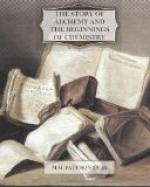And as it is with metals, so, the alchemists argued, it is with all things. There are a few Principles which may be thought of as conditioning the specific bodily and material forms of things; beneath these, there are certain Elements which are common to many things whose principles are not the same; and, hidden by the wrappings of elements and principles, there is the one Essence, the spirit, the mystic uniting bond, the final goal of the philosopher.
I propose in this chapter to try to analyse the alchemical conceptions of Elements and Principles, and in the next chapter to attempt some kind of description of the Essence.
In his Tract Concerning the Great Stone of the Ancient Sages, Basil Valentine speaks of the “three Principles,” salt, sulphur, and mercury, the source of which is the Elements.
“There are four Elements, and each has at its centre another element which makes it what it is. These are the four pillars of the earth.”
Of the element Earth, he says:—“In this element the other three, especially fire, are latent.... It is gross and porous, specifically heavy, but naturally light.... It receives all that the other three project into it, conscientiously conceals what it should hide, and brings to light that which it should manifest.... Outwardly it is visible and fixed, inwardly it is invisible and volatile.”
Of the element Water, Basil Valentine says:—“Outwardly it is volatile, inwardly it is fixed, cold, and humid.... It is the solvent of the world, and exists in three degrees of excellence: the pure, the purer, and the purest. Of its purest substance the heavens were created; of that which is less pure the atmospheric air was formed; that which is simply pure remains in its proper sphere where ... it is guardian of all subtle substances here below.”
Concerning the element Air, he writes:—“The most noble Element of Air ... is volatile, but may be fixed, and when fixed renders all bodies penetrable.... It is nobler than Earth or Water.... It nourishes, impregnates, conserves the other elements.”
Finally, of the element Fire:—“Fire is the purest and noblest of all Elements, full of adhesive unctuous corrosiveness, penetrant, digestive, inwardly fixed, hot and dry, outwardly visible, and tempered by the earth.... This Element is the most passive of all, and resembles a chariot; when it is drawn, it moves; when it is not drawn, it stands still.”
Basil Valentine then tells his readers that Adam was compounded of the four pure Elements, but after his expulsion from Paradise he became subject to the various impurities of the animal creation. “The pure Elements of his creation were gradually mingled and infected with the corruptible elements of the outer world, and thus his body became more and more gross, and liable, through its grossness, to natural decay and death.” The process of degeneration was slow at first, but “as time went on, the seed out of which men were generated became more and more infected with perishable elements. The continued use of corruptible food rendered their bodies more and more gross; and human life was soon reduced to a very brief span.”




